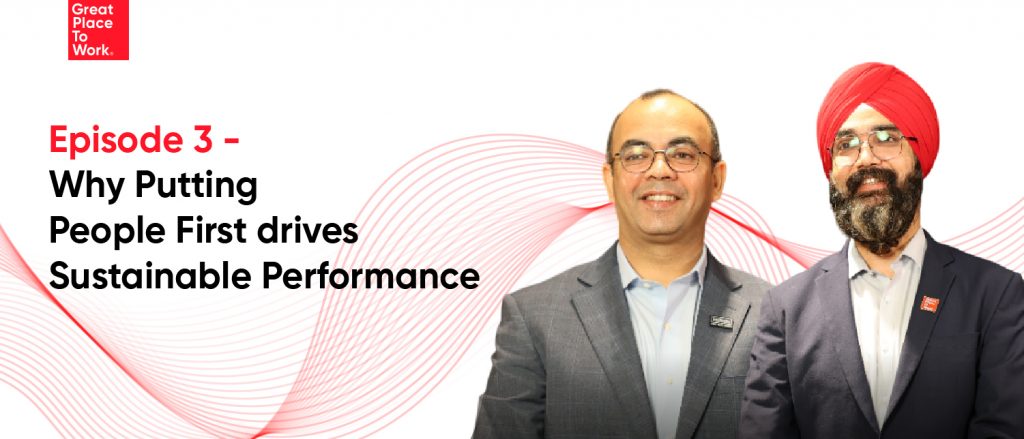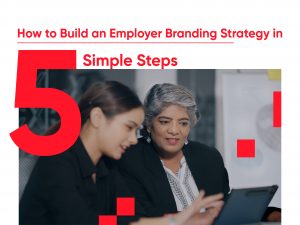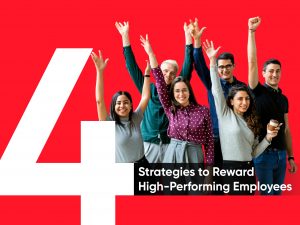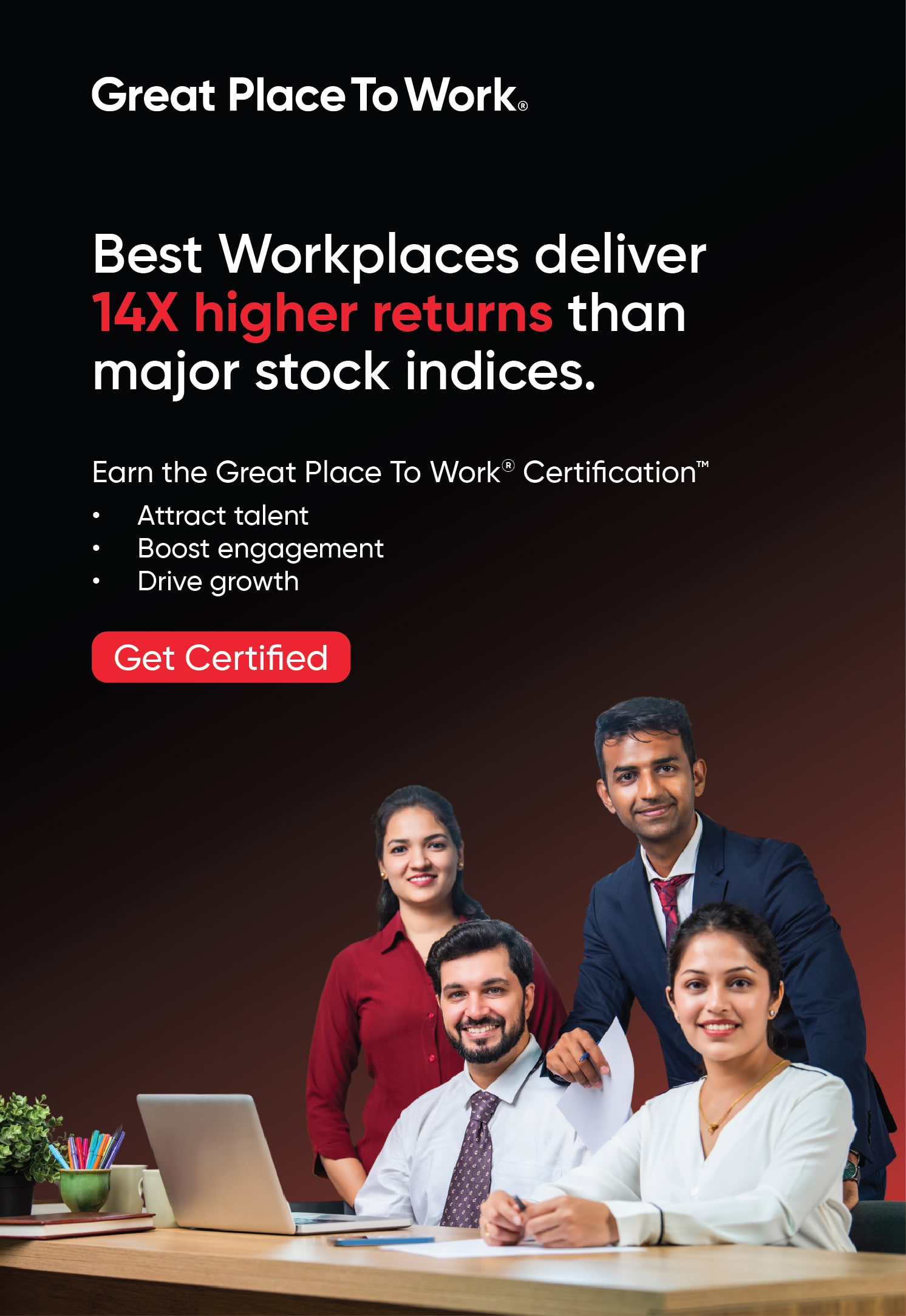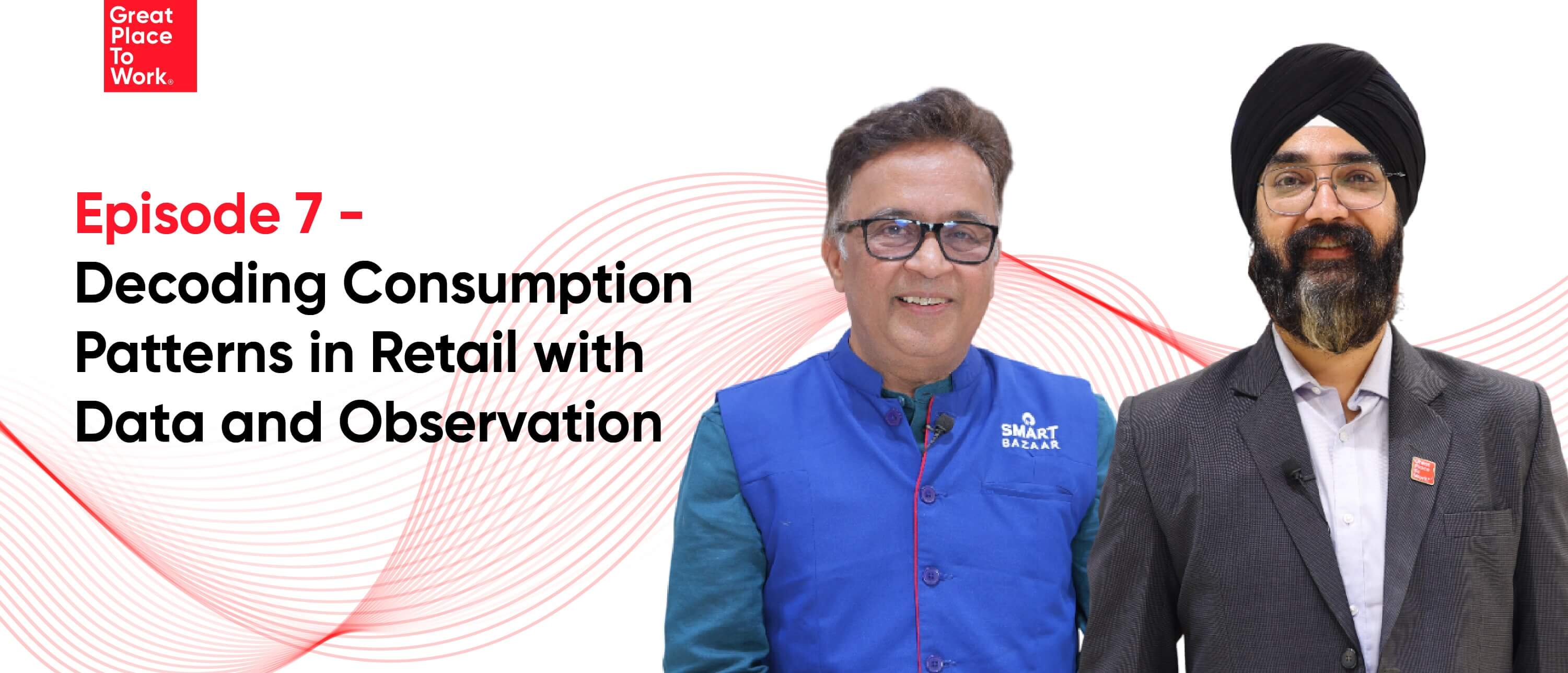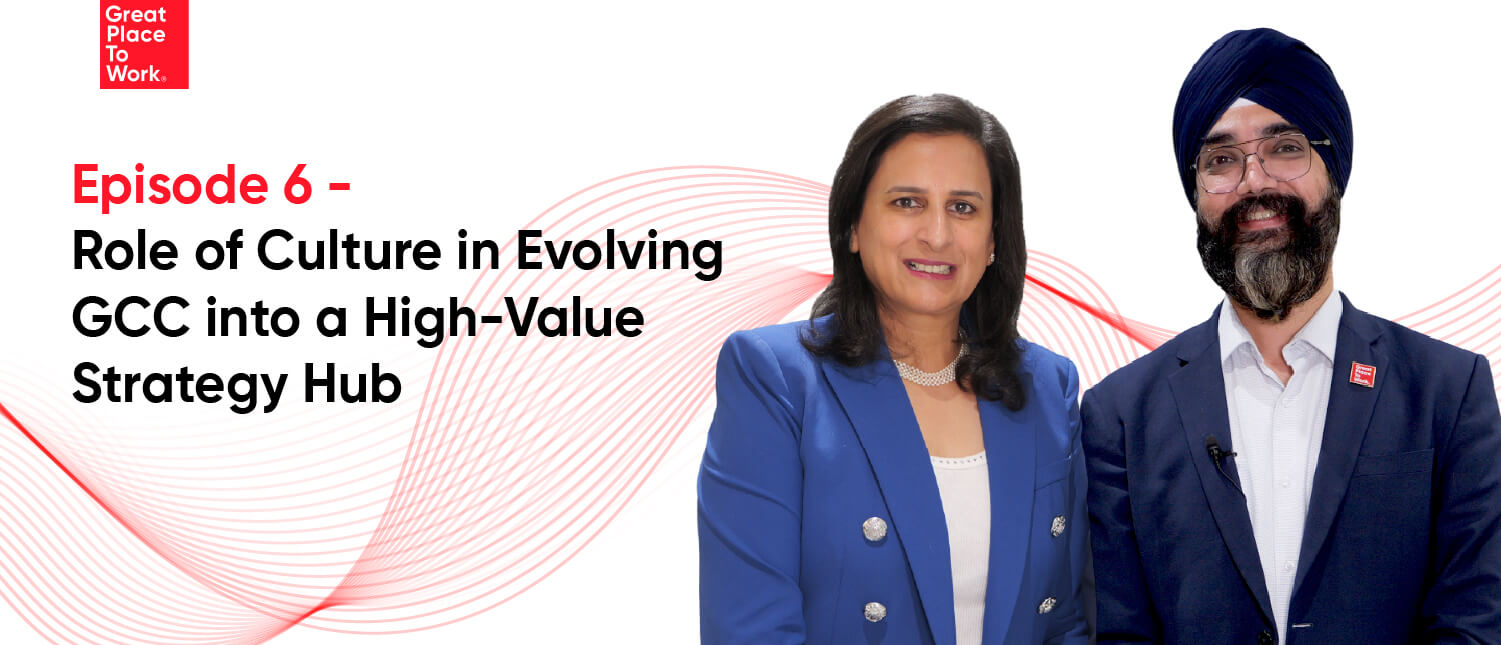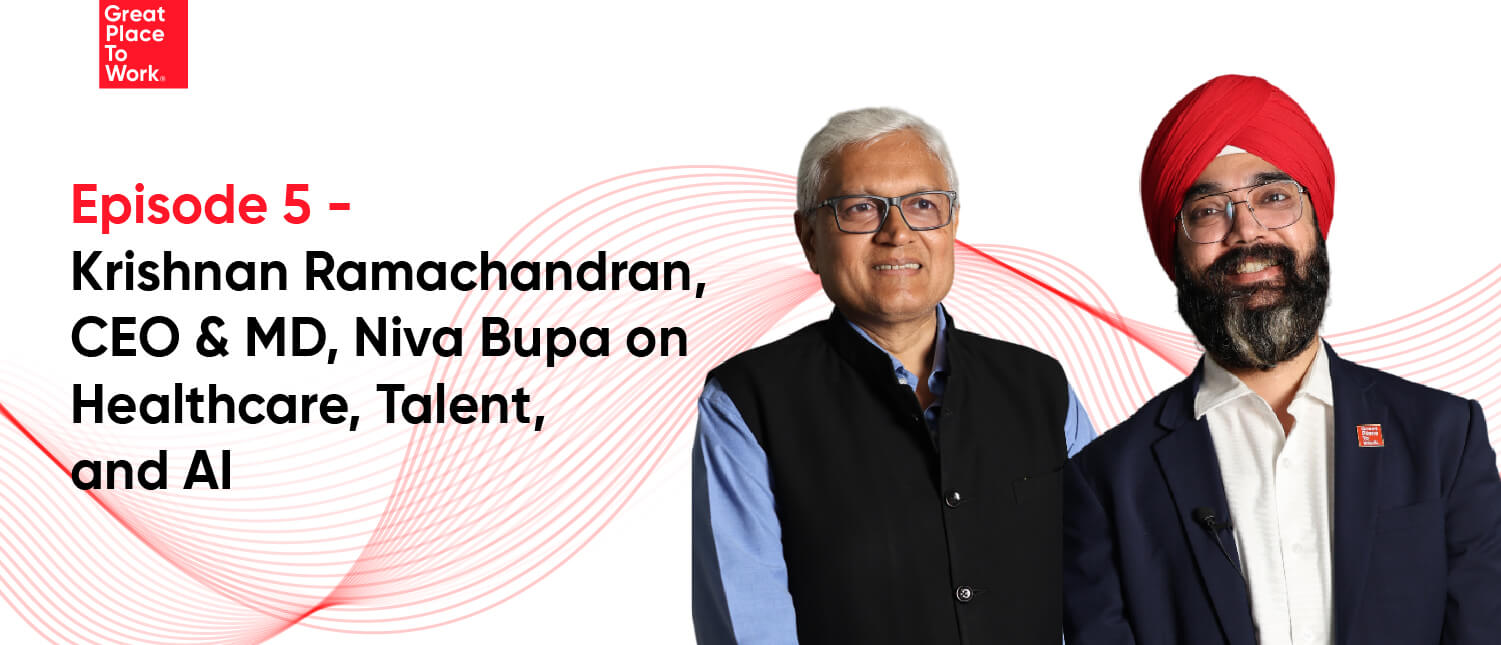Reading Time: 29 minutes
The Story Hilton Doesn’t Put in Its Brochures
Leading one of the world’s most iconic hospitality brands in a fast-growing and culturally diverse region requires more than just operational excellence; it calls for emotional intelligence, cultural fluency and a deep commitment to people. At Hilton, these are embedded in how teams work, lead and serve every day.
In the latest episode of the For All Podcast by Great Place to Work® India, Balbir Singh, CEO of Great Place To Work India, is joined by Zubin Saxena, Senior Vice President and Regional Head, South Asia at Hilton, for a candid conversation on how to sustain a people-first culture that promises higher revenues and shareholders’ returns.
From Front Office to Regional Leadership
Zubin’s hospitality story began in Delhi and unfolded across a decade in North America before bringing him back to India, one of Hilton’s fastest-growing markets globally. “I started as a management trainee,” he shares. “I worked at the front office…duty manager…and so on.” This diverse path gave him more than just technical knowledge; it taught him how to serve people effectively. “The human touch is very high”, adds Zubin.
His belief in India’s potential is clear. He believes India is one of the most exciting hospitality markets on the planet today, pointing to Hilton’s rapid expansion and growth strategy in the region.
The Indian Edge in Hospitality
What makes India unique in Hilton’s global portfolio of 8000+ properties? Zubin believes it’s a deep cultural value that shapes how hospitality is delivered. “In India, we say Atithi Devo Bhava – the guest is God. That’s how we operate our business.” He describes a culture where employees naturally exceed expectations.
Hilton’s growth in South Asia is built on that instinctual care, which is amplified by training, recognition, and trust. “We love to give that extra attention,” he adds, “that is what makes India unique in the global context.”
Hiring and Leading with EQ
At Hilton, empathy is a hiring principle and sits at the core of its leadership approach. Balbir Singh asked Zubin about his absolute non-negotiable when hiring his own team, to which he shares, “If you’re in the interview room, you already have the IQ, the differentiator is EQ.” He looks for leaders who listen, who take ownership, and who empower others. “It’s about being able to put yourself in your stakeholder’s shoes,” he emphasises, be it guests, owners, or frontline team members. This philosophy has helped Hilton double its team strength in India, all while retaining a 90%+ employee approval rating.
Empowerment at Every Level
How does Hilton ensure consistency across its growing network of properties? For Zubin, it starts with building a “circle of trust”. From small gestures like a housekeeping staff member anticipating guest needs, to training in Hilton’s core values of hospitality, integrity, leadership, teamwork, ownership, and now, every team member is empowered to deliver exceptional experiences.
“Ultimately, we’re in the happiness business,” he says. “And our frontline is fully empowered to make our guests feel like a million dollars.”
Technology with a Human Touch
Despite being deeply rooted in tradition, Hilton is readily embracing the future of technology. Zubin shares about AI and automation reshaping the hospitality experience, from digital room keys to intelligent climate control. He, however, also believes that technology will support, not replace, the human connection. “But values will always be our moral compass,” Zubin notes.
Looking Back, Thinking Forward
Just as the conversation wraps up, Zubin speaks about what advice he would give to his 20-year-old self. His answer is simple, but it lands with unexpected weight. It’s about something we all carry, often without noticing, but something most of us forget along the way.
Tune in to the full episode to hear what he told his younger self? You might just find it’s something you needed to hear, too.
Show Transcript
Balbir Singh: 0:00
Hello and welcome to another episode of For All Podcast by Great Place to Work India. I am your host, Balbir Singh, CEO of Great Place to Work in India. In this series, we’ll be speaking with leaders from India Inc. who have created great workplaces where employees really prosper. In this episode, I have with me Zubin Saxena. Zubin is SVP and Regional Head, South Asia Hilton. Welcome Zubin for your time. Pleasure to be here, Balbir. Hosting us at your lovely property. It’s
Zubin Saxena: 0:31
a pleasure.
Balbir Singh: 0:32
And I’m not going to the ranking right now, but one thing I wanted to know from you, Zubin, as we start, help us with your introduction. Your background is, have you always been in this hospitality industry? How did you get started? Something that only you can tell. You can read a lot on LinkedIn and social media, but something that only you can tell us.
Zubin Saxena: 0:54
You know, I pride myself on being a career hotelier. And I have been blessed over my career journey to witness and experience various facets of the business. I’ve worked across various geographic domains, you know, so of course, I’ve worked in South Asia extensively, you know, I have also worked in North America for nearly a decade. And I’ve traveled the world a little bit here and there. So I’ve been in this lovely business of hospitality for the last nearly 25 years now. And I remember as a young child, a young kid from Delhi who was looking to seek career opportunities, you know, this was always a sector which I found hugely inspiring and attractive. You know, if you recall at that time, You know, Delhi used to have only five or six hotels, and they were all landmarks within the city. And now you see, of course, Delhi itself alone has got a few hundred hotels, perhaps in India has also grown as a market. So, you know, my journey has been a little bit of along that tenure where I’ve seen this industry grow from a very nascent stage in India. And of course, I went to hotel school here. And then I went to the UK to undertake some management education. And thereafter, I was placed in New York for, like I said, nearly a decade, working more on the financial investments, hospitality investment side of the business, only to come back. about a decade ago, a decade and a half ago, 12 years ago, back home, you know, anticipating that India is going to emerge as one of the fastest growing hospitality markets in the world. And, you know, look back in time, it’s turned out to be true. You know, this has become one of the most attractive, fastest growing, you know, one of the most exciting markets on the planet today. So that’s been a little bit of my journey. Of course, experience hotel operations, which I’ve come in from a front office background myself, started my career as a management trainee and then into the front office operations as a duty manager and so on and so forth, and then moved on. So I have meandered along Over the years, a very exciting journey. I had the privilege to meet some really successful, really inspirational people. you know, along across all stakeholder groups, you know, our owners, our team members, our guests, you know, they’re all inspiring, inspiring stories, so many of them, you know, this is an industry, which is a people driven industry, you know, this industry where people are serving people, the human touch is very high. And personally, for me, you know, I enjoy that human interaction, I enjoy that, you know, engagement, So for me, it’s been being in the right place and at the right time and, you know, just enjoying the ride.
Balbir Singh: 4:24
Awesome. Awesome. I think this really helps set the context. And since you have been a career hotelier and traveled across the globe, and this is an industry, even if you are located in one city, you get to experience various nationalities coming into your hotel and property. So tell me something. From your experience, what are the different cultural nuances, you know, in which way that Indian hotel industry is slightly different from the rest of the world? Because you are leading, you know, one of the fastest growing hotels in India. And I heard your plans to expand. Significant expansion underway. Significant expansion underway. You’ll double your headcount. So how is India culturally, and especially from a leader’s lens, a CEO’s lens, when you’re managing such a big, you know, people, how are we developing? different from rest of the world
Zubin Saxena: 5:16
you know um I would say uh I would say all cultures so Hilton has a global presence more than 8 000 properties around the world um you know work we have hotels across uh across all continents you know uh usually usually spread out vast business um And the cultural nuances are very different in every country and every domain, right? So I think as a global company, one has to respect those cultural, that cultural diversity, you know, across the domains you are working in. India is, and it’s our founding belief, and we’ve all as Indians grown up to this, you know, it’s called Atiti Dev Bhava. And Atiti Dev Bhava in English translates to the guest is God. And, you know, growing up in the Indian culture, you know, as children, you know, and that’s the same values we give to our next generation as well. When you have a guest at home, you are treating him as if God’s come to your place. And as children, you are taught that if the house does not have enough bedrooms, then you offer your bedroom to your guest and you sleep on the sofa outside. So those are the values which are common Indian values. Those are the values which we are so proud of as an Indian community. nation. And those are the values which translate into our business, you know. So within the Indian context, it’s a very, very high touch, you know, environment, you know, which we have grown up in. And again, you know, we love to give that extra personalization and extra attention to our guests, right? So that is what makes India unique in the global context. So that’s what makes all markets unique. I would not say one is less and one is more. I would say they’re all different. different markets uh with different um cultures and we have to respect all cultures but clearly India is the land of and that’s how we operate obviously
Balbir Singh: 7:26
I can I could feel that sentiment resonating with some of the other leaders also and in fact hospitality is the highest scoring industry in India uh in my top 50 fiber hospitality uh players oh really yeah yeah yeah and uh where do you see the highest employee engagement of course Hilton is top of the pops but I see that sentiment you know being played out in other companies also as a leader you know how do you inspire your people to go that extra mile to be closer to the customer because this is an industry where you are Always in touch with your customer. So what are that leadership wisdom that you learned in your career that you look forward to, you know, imparting your next generation leaders? And what are some of the things that have stayed with you and helped you make this an organization that is loved by employees?
Zubin Saxena: 8:24
Yes. So, you know, we are in the business of people serving people. And hospitality, our sector has perhaps a higher degree of human intervention, a higher degree of human connect, you know, than some of the other industries in the manufacturing of the some of the other sectors, let’s say, you know, we are, as hoteliers, you know, we are taught to anticipate our guests expectations, you know, and it is just a lot of you know, training around that. A lot of, you know, just anticipating what your guests would need to understand the cultural nuances. And just a lot of training also, you know, is… is constantly what our teams are doing. So, you know, that’s how we are constantly in connect with what our customer, what our guest needs. And of course, you know, we are very cognizant of their preferences. You know, certain guests would want a different set of pillows when they check in. Certain other guests would want a certain kind of a toothpaste when they want to check in. We are sensitive to that. We enjoy doing that. And I think, you know, beyond the the standard guest room offering, you know, which all hotel companies would provide, you know, you have a guest room, which has a switch as a bed, which has other amenities, which are fairly standard. I think the big differentiator is human connect. And especially for Hilton, it’s a big way in which we like to achieve our, you know, achieve excellence in what we do. So this year, you know, we have, you know, so that’s our journey. from becoming a great place to work into becoming a great place to stay.
Balbir Singh: 10:20
So Zubin, you know, at Hilton, since as a CEO, you can’t be at every property yourself, I know you travel extensively. So what are the qualities that you look for in your leadership team when you’re hiring? So when you’re hiring a general manager for all the new properties that you have, what are the some of the qualities that you look for in a leader that you’re hiring, especially reporting into you?
Zubin Saxena: 10:41
Sure. See, there are two things. And in my view, success is a combination of two factors. There is IQ and there is EQ. Yeah, right. There is intelligence quotient and then there is the emotional quotient. To me, when I am involved in a hiring decision, EQ for me or empathy, let’s call it, is one of the key attributes, which I lay a lot of emphasis on. Because your leaders need to be able to listen, to be able to understand, to be able to empathize, to be able to put themselves in your stakeholders’ shoes, be it our hotel owners, be it our guests, be it our team members. Because unless you are not able to put yourself into the shoes of the person you are you are interacting with, you would never truly be able to deeply understand what their concerns really are and how the perfect solutions will come out of that. So I think empathy to me is a leading attribute. Empathy to me is perhaps even more important sometimes than IQ. So EQ being more important. If you are in the room, if you’re already in the interview room, you already have the IQ. That’s my point of view, right? I think what is the differentiating factor is the EQ, is the empathy, right? So empathizing leaders, leaders who like to listen. Second is leaders who like to take ownership. You can never be truly successful until unless you own the task that you’ve undertaken. So that is, again, extremely important from my perspective.
Balbir Singh: 12:29
So, Azubin, you touched upon three very important aspects. You told human connect, empathy, and listening. And intentful listening is one of the… top behaviors of leaders as per the study done
Zubin Saxena: 12:43
by great place to work so we are we are on the same page so
Balbir Singh: 12:46
when we look at uh you know for any authentic leader listening caring developing inspiring are some of the key behaviors that you don’t come at the top and at hitter you know how do you uh empower your leaders so when you talk about ownership but with ownership also they also should feel empowered to take decisions and not just at the leadership level you know share some experiences with where a front desk uh manager or a cleaning officer they also feel empowered to do their job without being judged without fear of failure so how have you created that environment of trust in your organization where people can go about doing their job uh You know,
Zubin Saxena: 13:33
it is a circle of trust you create. And that circle of trust gets created over a period of time, you know, so it gets created in your day to day interactions with your team members, you know, it gets created over a deep communication cycle over deep conversations. And, you know, where you are discussing your business problems or your business issues in a very open format. you know, you are not thinking, you know, what the consequences might be, you know, but rather, it’s about, you know, let’s have a heart to heart discussion, let’s, let’s seek, you know, the right responses to certain situations and certain issues, you know, so in our case, we like to build that circle of trust, right? We are, of course, you know, we pride ourselves at the top talent that we have, you know, across, across the organization. And And then the next thing that you can do once you hire the top talent is to give them the space to perform and deliver. Ultimately, we are in the happiness business. We are in the hospitality business. And ultimately, we need to make sure that our team members, our frontline ensures that our guests feel like a million dollars when they are staying with us. And they are fully empowered to do whatever is necessary to achieve that experience. Of course, a lot of that is, you know, falls within the Hilton value framework, right? And the H-I-L-T-O-N Hilton, you know, every alphabet in that stands for something. So the H stands for hospitality, the I stands for integrity, the L stands for leadership, the T stands for teamwork, O stands for ownership, and the N stands for now. So those are the global Hilton values, which our team members go through during the training process. And within In that broad framework, they are given or they have the empowerment to deliver those guest experiences. And it’s not only guests, it is all the other stakeholder groups we also interact with, be it our partners, be it our owners, be it our team members. It is ultimately about the human connect. It is ultimately about people serving people. And that is a very honest, very sort of relationship that you need to form
Balbir Singh: 16:06
so you talk about human connect and people serving people my assumption would be that your industry will be the least impacted by AI and do you see your industry getting impacted by artificial intelligence and everything that’s happening crazy things that are happening now or you think your industry is safe and in a happy place I
Zubin Saxena: 16:27
think the world is changing and if you think the hospitality industry is not Thank you. uh impacted by any of the technology changes that are happening in the world today i think we will be misinformed in our thinking uh you know you’re staying at our hotel yeah and uh just a very i think it’s a very small example you know you probably got the digital key uh so there would have been a message which landed on your inbox you know with your digital key that that with the request to activate it uh that’s a very uh that’s one of the examples of how technology is entering our business today you know then you perhaps might have got uh a a message, you know, inquiring your well-being and your comfort in a hotel room. I would say where we are right now in the cusp of technology, we are in a very nascent stage, generally the world I’m talking about, right? And our industry in the future will be, I think, for the better influenced by AI and technology. And I’ll explain how. You know, it’s not only the… the guest experiences you know for instance a guest checks in to your hotel and you have sensing sensing you know software in the hotel where you know if he looks into a camera just by how dilated his pupils are you can kind of sense the the how the guest is feeling at that point in time that might trigger the air conditioning you know if you think that the guest is anxious you know or if he’s more relaxed you know so that might trigger the temperature levels in the room that’s the level of tech that’s I would say the It’s going to go much beyond this. This is just one of the very, you know, I think this is just about, this is bound to happen, right? Then there is a whole business at the back of what you see, which is going to be driven quite extensively by AI as we go ahead. And that is around revenue management models. That is around business forecasting. That is around, you know, just having demand optimized models working in that’s about just analyzing your guest preference data and then curating his experience or their experience for the next day to the next level you know that is the other side of AI which is going to and already has started impacting and Hilton is at the forefront of many of these things you know so AI and the third thing which is going to become a reality is and which will trigger the faster growth of AI in our industry is is talent. As fast as the industry is growing in terms of the number of rooms, and I’m talking about India right now, finding the right talent to service our hotels and service our guests is perhaps one of the biggest challenges we are facing as an industry today. So you will see a lot of automation come in Not because we don’t want to create jobs, but because we are at a dearth of finding enough people to man our hotels. I mean, look at our hotel management institutes today, for example. We do not have enough attendants to carry through with the sessions, right? So that is becoming a reality. I wish our industry, and I think it’s something which we need to do together as business leaders in hospitality industry. We need to raise the attractiveness quotient of our industry and attract new talent. And it’s a very exciting industry to be in. So AI will change the world. AI will change the hospitality industry. And I think in our case, it’ll only be accelerated because we are also at the same time going to be having a real manpower. I wouldn’t call it a crisis, but I’ll definitely call it a challenge in the future. in the years ahead.
Balbir Singh: 20:29
Yeah. What is surprising when I listen to you, Zubin, is that When I look at IT talent, most of the engineering colleges are full, but they don’t have enough jobs or they’re not trained what is required at the workplace. And what you’re seeing in hospitality, hotel management colleges are not able to fill in the seats. So I think we have two different extremes. But what is it that industry can do? And India has that demographic capital where most of our know workforce is gen z so they are just entering workforce and hospitality as a sector has huge percentage of gen z employees uh in fact as good as 35 percentage and if i were to combine gen z and millennial that’s about 70 percentage of the workforce is gen z and millennials you have a very young workforce uh so what are the some of the things that you do at hilton uh to attract this young workforce and retain them of course hilton is also considered as the talent factory of the world uh and but what do you do especially to retain attract and retain young talent
Zubin Saxena: 21:35
so our belief is that some of the best hospitality talent will enter the industry from sectors or, you know, with educations, which are not necessarily from the hospitality domain. Meaning to say that, and this is my personal belief, some of your best managers will perhaps come from the banking industry into our industry. You know, there might also be a reverse flow, you know, going from our industry into several other service industries, but clearly there’s going to be a talent import So we need to be open-minded towards those kind of trends. We are already, as we get into our recruitment cycles and we go seeking top talent across the country, we are interviewing a lot with universities. We are interviewing a lot with graduates who do not necessarily have a degree in hospitality management. So but they have the skill set, like I said, IQ and EQ, you know, but they have the EQ to become excellent hoteliers, you know, and then it is our job as, as, as Hilton to train them into becoming great hoteliers and which we very proudly and happily will do. So that’s, those are, so expand your horizons, expand your sectoral reach. You know, we have management training programs where we are, you know, going around the country to, to, to identify top talent who will then become managers with us on an accelerated growth pattern, right? So they go through accelerated programs and then grow as managers. You know, I, when I started was a management trainee myself. So that’s been my entry into this sector, right? Then also we have most recently, you know, done a few tie-ups with across, you know, across the country, And one of them has been with the Indian Army. We are very proud of that, where we are opening up our hotels to retired army personnel and welcoming them into our business. I think there is a great talent fit between the two sectors.
Balbir Singh: 23:58
So in a high growth industry, you almost always face burnout as a consequence where people feel they’re overworked because there’s so much happening. So how do you personally take care of your own being and inspire your team to you know feel safe psychologically safe and create a work environment that we where people can express and be their own selves
Zubin Saxena: 24:22
sure so um you know my personal mantra is to be very disciplined around how, you know, one conducts their professional and personal lives. So it’s important to have boundaries, you know, it is important to follow timelines, as important as it is to focus on your work assignments, I think it is equally and more important to be focusing on your family. So in my case, you know, I like to keep a very balance between the two. I encourage my teams to have the same balance, you know, and because, you know, if you have to run fast, you know, and that’s when burnout happens, you know, then you tend to ignore a few factors. But if you have to go far, right, then it is a marathon. It is not a sprint. And then you have to be very regulated around making that, having that work-life balance. Hilton as an organization greatly supports work-life balance. balance you know there is a there are uh you know several initiatives within the organization that support a great workplace culture a great work-life balance for example you know we have something which is uh a caregiving leave you know so uh you know it’s it’s uh you know if you want to care uh take a day off an unplanned day off to care for uh for uh you know for someone even if it is your pet it’s okay you know um and we are of course, quite mindful of ensuring that our team members have their personal time as their own. So, you know, it’s a culture thing. And people respect that. And, you know, so that’s how it is at Hilton as a company. For me personally, you know, like I said, it is about having been quite structured and disciplined around both my work life and my personal life. And then, you know, I decompress, I have a lot of friends you know and I exercise and I do my own things which keep me keep me balanced and happy
Balbir Singh: 26:38
okay last couple of questions from my end and then we move to a quick rapid fire okay first you know who is that leader that has inspired you the most in your career as a hotelier in the last you know two and a half
Zubin Saxena: 26:52
I think it is Conrad Hilton it’s about dreaming big dreams and you know and it’s a hundred year old dream That’s good. I think when you have a legacy
Balbir Singh: 27:15
that you can look up to, and you can see that in play around you. I think that really inspires you to give your best. So how has the Great Place to Work partnership, and Hilton has been partnering with Great Place to Work globally, has helped you, Zubin, in your role or the CHRO that you have? How has it helped you?
Zubin Saxena: 27:35
Multiple ways. To start off with, it is the GPS we follow. okay you know now that we are we are um you know uh best place to work uh india’s best place to work two years in a row uh and of course globally in multiple locations also you know um as an organization uh you know the the um The results and the surveys and the whole association with Great Place to Work has, I would say for us, really served as a GPS. It has been telling us what is the direction our business is following. And more and more as you… you know, receive the honor for us now with the second year, and hopefully we’ll get in, get it the third time also, you know, it becomes even more important to keep it that way, you know, so I think, like I said, it’s a GPS, it is keeping us on that path of excellence, you know, on that path of being a great place to work. Second, I think the data insights are amazing, you know, and typically, I think the general industry average out there is about 51 or you would know the numbers better but I read is in the 50% approval rating. Hilton has a 90% plus approval rating. So I think that is the barometer we are following and of course it’s a badge of honor. We like to keep it that way.
Balbir Singh: 29:09
Yeah. And we have a saying, great workplaces are heroes. So we get to learn as much from this partnership as you value it. And then we basically, our mission is to make India a great place to work for all. So these are these values and principles that we learn from some of these great workplaces and pass on.
Zubin Saxena: 29:24
You know, Gulbir, I’ll tell you, it has a very beyond the HR angle. I think it has great business consequences as well. You know, happy team members, right, in our business would result in happy guests. Happy guests would result in happier revenues, higher revenues. Higher revenues would mean higher ROIs for our owner partners who are building these lovely hotels, huge investments, you know, and we have to ensure that those ROIs are there for them. And, you know, more profitable hotels and which will result in higher owner confidence will ultimately lead to higher growth, you know. So I think it is a very important starting point for the entire value chain to move upwards and I think to your point you know the great place to work association for us is you know pushing us higher and higher in that direction and we are truly enjoying this journey
Balbir Singh: 30:30
yeah we see that we say this better for people better for business better for world so if something is better for people then there are you know this positive consequences that you see so we’ll move to a quick rapid fire Zubin just one line or two line answers uh first one is uh and i think it’s a difficult question for me to ask rather than not for you to answer because you have been in the same industry for 25 years so what would be your advice to a 20 year old zubin good great
Zubin Saxena: 31:01
question uh don’t don’t draw a glass ceiling for yourself the glass ceilings are meant to be shattered So don’t just, and I, in my own experience, now that I look back, you know, having been around for 25 years or so, every time I’ve tried to set a glass ceiling for myself, you know, I’ve worked towards shattering it and then moved on. So to a younger Zubin would be the sky’s the limit, you know, and for the younger generation would be believe in yourself, the sky’s the limit and just work towards shattering towards that goal towards a higher goal every day every day you have to be a better version of what you were yesterday it can be a one percent incremental improvement that’s okay but if you compute it over 25 years that will run into thousands of percentage points and i think that’s amazing
Balbir Singh: 31:53
there’s compounding for you
Zubin Saxena: 31:54
yes and uh yes that that is what i would uh um i would say to to the younger generation. Don’t set a glass limit on yourself because the moment you do that, you know, you would not want to fly past it. And to me personally, those glass ceilings are meant to be broken, meant to be shattered.
Balbir Singh: 32:13
What is that one question that you always ask in an interview?
Zubin Saxena: 32:18
The one question that I always ask in an interview is around how someone has converted for them or for their teams, challenging situation into an opportunity. And to me, when, you know, the response to that really provides lens insights into the mind that the thought process is working. And, you know, I’ve had some great feedback on those questions, you know, and I’ve had some. Now, when I look back, you know, some of the stars I’m working with, you know, many of them have always have been eternal optimists. You know, they’ve seen they’ve always seen the situation, you know, the glass half full. And that’s the talent you want to be with. And I think optimism is a great trait to have.
Balbir Singh: 33:16
Especially, I think, when we had the pandemic five years back, this industry was thrown right in the middle of it. You were at the forefront. There were a lot of challenges. And I think the way this industry has come out of it, I think at least in India, I look at the occupancy rates sitting at 85%. It’s crazy. So what is that one book about? uh you can answer you can say multiple books that you like like the most or it could be not just You took inspiration from just that you like?
Zubin Saxena: 34:13
you know, a situation is irrational, but it really isn’t, you know, so you have to find the opportunity in a rational situation. And so, so that’s one. The second one, which is kind of along the same theme is called Freakonomics. Yeah, you know, and Freakonomics, again, is a book where, which talks about the unseen opportunity in situations, you know, it talks about things like the butterfly effect, you know, a tiny butterfly, let’s say in the Amazon forest flaps its wings and there’s a displacement of some air current around it and then that becomes larger and larger and somewhere you know so it’s flapping its wings in Africa and somewhere in Asia it results in a huge hurricane so you know that is the big impact of small things and that’s what I really find interesting in the anecdotes in that book and the third one is by Simon Sinek it’s called Leaders Eat Last and I believe in it a lot myself I think the job of a leader is to carry his or her team with them. And unless until the team has not finished across the goalpost, the leader still has to be the last man standing. So three very inspirational books. And I like, I keep referring to them from, you know, time and again, because I find them quite interesting and intellectual.
Balbir Singh: 35:37
These are three great books. I’ve read two out of those. Okay, which ones have you read? The Upside of Irrationality, I haven’t read that book. i’ll pick it up and uh what’s the
Zubin Saxena: 35:46
best i’ll send you a copy
Balbir Singh: 35:47
yeah thanks what is the uh best career advice that you receive from anyone in your life
Zubin Saxena: 35:54
the best okay the best uh i’ve received a few and i must say i just need one today the best career advice that i have received And I am thankful to, and I’ve actually received it not from one, but I received from a few of my mentors who have themselves been hugely successful people. But they’ve given me the same advice is always take care of your relationships. You know, and I received that advice when I was 23, 24 years old. from one of my mentors, and I’ve continued to receive that advice over the years, you know, so many times. It is about keeping, you know, the power of relationships, the power of positive relationships. And, you know, what, and I keep saying this to my teams as well, that, you know, in life, and life is, you know, has many chapters to it you know once you are in the next chapters of your life you know if you are crossing each other or if you are just you know impromptu bumping into each other you should have that kind of connect uh you know with people that you can sit down and have a cup of coffee and have a laugh because life is about about that ultimately you know the rest is all The rest all happens, comes and goes. But I think the power of relationships is extremely important.
Balbir Singh: 37:25
Yeah, I think those are the things that stay with you.
Zubin Saxena: 37:27
And build them in an honest way. Build them in a truthful manner. Genuine. Genuine manner. Genuinely caring. I think because, like I said, people run businesses. Businesses don’t run themselves. People talk to people. We are in a people world. And the human aspect is perhaps the most significant aspect, be it in your professional life, be it in your personal life, but human relationships are most sacrosanct and have to be kept in that. And that’s something which we like to also imbibe at Hilton Hotels.
Balbir Singh: 38:02
And I think I know the answer to the next question I’m going to ask, but I’ll still ask. A skill that you think every professional must have in this day and age when we have AI, we have… lot of things happening around us. What is that one skill that every professor
Zubin Saxena: 38:17
adaptability one has to be adaptable? Yeah, you cannot draw a firm line in a highly dynamic environment. You know, you will, you will have to adapt to how the world is working to how the situation is evolving. And in difficult times, you have to adapt, but your values have to be the moral compass, which drive that adaptability. And I think COVID was a great example of that for all of us in this industry, you know, so adaptability is most important. And, you know, adaptability, combined with, you know, following your values as your moral compass, I think is will always keep you on the right path, do the right thing, very important.
Balbir Singh: 39:11
And my last question, if you were to summarize your leadership journey in one word, I know that might not be possible. What would that be?
Zubin Saxena: 39:22
What would that be? I would, I would, like to think of myself as perhaps a transformational leader you know i have been in business situations uh and uh you know been part of transformations over my career journey so um if there’s one word that you asked me to put out that’s how i would uh hope uh uh you know to be thought of as a transformational leader yeah
Balbir Singh: 39:50
Thank you, Zubin, for that candid conversation. I think there’s so much to learn for young professionals who are just starting their journeys and leaders who have been there, done that. But there’s always some new perspective that you get from listening to leaders from other industries. So thank you for this
Zubin Saxena: 40:07
conversation. Thank you, Balbir. This was really good. Thank you. You took me on a soul-searching mission myself, and you asked me a lot of deep, intriguing questions. So thank you for… for um letting me uh down that uh soul searching mission in this last uh in the last few minutes um very very enjoyable conversation thank you thank you thank you you’re
Balbir Singh: 40:33
so good thank you thank you

